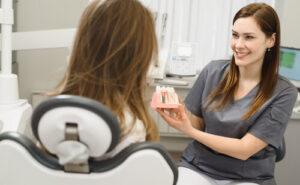If you recently received a dental implant, you may wonder what you can do and how to heal faster after dental implants placement. How long will it take to get back to your day-to-day routine? Should you expect oral pain the week after your surgery? We want to keep you informed about the expected dental implant healing process. Here’s a timeline of what you should expect while recovering from dental implant treatment. Click here to get more information.
Expectations 24-72 Hours After Surgery
After placing your implant, you will likely not experience intense or lingering pain due to the numbing and sedation utilised during the surgery. However, our dentists can also provide a prescribed medication for any discomfort– so be sure to fill it if one is given!
As a typical result of the implant surgery, you may experience moderate soreness, swelling, and bruising near the surgical site for at least three days. It’s essential to remember that this is completely normal since implanting involves cutting through bone and gum tissue. You should expect some bleeding in addition to these other symptoms as well.
Following your procedure, ensure to take it easy while allowing yourself time for proper healing. To aid in this process, try sticking to a softer diet and be sure not to chew anything tough near the implant site or brush directly on the area itself within three days of surgery. By doing so, you can rest assured that everything is progressing well!
Expectations 3-7 Days After Surgery

Once the discomfort around the implant site begins to ease, you may brush it with a toothbrush featuring soft bristles. Consuming only soft foods for approximately one week after treatment is recommended. Once five or seven days have passed, it should be safe to take up strenuous activity and get back into your regular fitness routine or laborious job tasks. Click this link to learn more.
Expectations 1-2 Weeks After Surgery
After a week’s time, you should no longer experience a significant amount of pain or tenderness at the implant site; however, feelings of sensitivity may still remain.
After at least two weeks, your implant should be fully healed. As such, when using it, you won’t experience any tenderness in the area near the implant or have any aches and pains. During this time frame, either get ready to remove the stitches yourself, or they will dissolve if self-dissolving threads were used during surgery.
If you experience any pain, swelling, or discomfort near your implant after two weeks post-procedure, this is not typical and can indicate a problem. You should seek dental assistance immediately to ensure the healing process has gone correctly and that no infection is present. Don’t hesitate to get checked as soon as possible for optimal results!
Dental Implant Surgery: Tips to Heal Faster
Are you planning to get dental implants? If so, you’ll want to make sure that you heal as quickly and safely as possible. Here are some tips for healing faster after your dental implant procedure.
Cold compresses
Bruising and swelling are commonplace following implant surgery, although this varies greatly from one person to another. Cold compresses can help manage the situation and also help reduce pain and discomfort.
Take your antibiotics
You’ll be prescribed antibiotics to prevent infections and improve the acceptance rate of your implant. Take the full course as prescribed.
Have a Good Diet

Nourishing your body with the right nutrients from a diet full of vegetables and proteins is essential for healing swiftly. Additionally, being mindful about what you consume can greatly reduce inflammation in your mouth, providing quicker recovery times.
Brush thoroughly and floss daily.
In the 24 hours following your surgery, you’ll likely have too much swelling and pain to be able to brush or floss, but as soon as you can, it’s important to continue your daily oral hygiene routine. Maintaining a healthy mouth by brushing twice a day and flossing daily is always important, but it’s even more important when caring for dental implants.
Make healthy lifestyle choices.
Alcohol and tobacco use can severely impact your mouth’s ability to heal, as both substances dehydrate it and constrict blood flow.
Follow Post-Procedure Instructions
Whether you’ve had your implant surgery here or outside the country, proper aftercare guarantees a successful healing process following an implant procedure. Therefore, it’s vital that you follow your dentist or oral surgeon’s instructions carefully and without fail: take the prescribed medication, avoid consuming hard or crunchy foods, and cleanse your mouth daily. Doing so will ensure that you experience optimal recovery results.
Get Plenty of Rest
After undergoing dental implant surgery, restful sleep and taking it easy are paramount for your healing process. Avoid participating in strenuous activities such as exercise or sports while you wait until your mouth has completely healed. Although physical activity is a crucial component of well-being, resist the urge to overexert yourself—it can lead to excessive bleeding! Wait at least several days before restarting your workout regimen to ensure everything stays nice and stable around the incision site. Additionally, getting 7–8 hours of quality zzz’s every night will give your body ample time to restore itself back to its normal state.
Visit Your Dentist Regularly

Dental Implant Surgery and Smoking
Everyone knows smoking is detrimental to your overall health, but it can be especially harmful to oral health. Nicotine reduces blood oxygenation and slows blood flow and healing, all of which are essential factors in the success rate of recovering from dental implant surgery. So if you smoke, think twice before getting implants!
Though it is feasible for smokers to obtain dental implants, we highly recommend quitting smoking beforehand. Even if you delay cessation of use until after the healing process has been completed, tobacco can still have a negative effect on the success rate and potentially lead to implant failure. To guarantee optimal results, consider taking this opportunity to quit smoking altogether!
As a smoker, if you are considering dental implant surgery, it is imperative to abstain from smoking for at least one week prior to your procedure and two months after the placement of your implants. Additionally, make sure you brush twice daily and rinse with mouthwash to reduce any damage from tobacco use. Finally, keep up with regular trips to our office for cleanings and dental exams; this helps ensure success!
Following the tips that we gave you on how to heal faster after a dental implant procedure while decreasing the risk of complications down the road. Be sure to consult a qualified oral health professional if you have questions or need additional guidance concerning your unique situation! Contact us at (02) 9158 6328 to schedule an appointment with our dental team. We will do our best to answer your questions. With DDSS, your goal to have an implant that looks like a natural tooth may come to life.
References:
https://www.deardoctor.com/inside-the-magazine/issue-21/dental-implant-maintenance/
https://www.ncbi.nlm.nih.gov/pmc/articles/PMC4897104/
https://www.todaysrdh.com/implant-maintenance-an-overview/
https://www.mayoclinic.org/tests-procedures/dental-implant-surgery/about/pac-20384622





